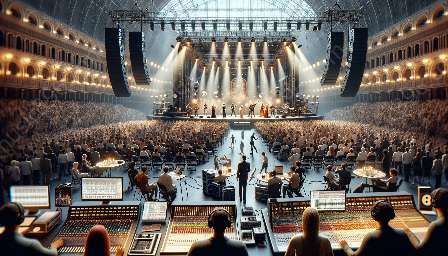Industrial music has long been noted for its impactful and often intense soundscapes, but the effects of its performance on the emotional and psychological well-being of its performers are worthy of exploration. This article delves into the influence of industrial music on performers' mental states, drawing comparisons to other music performance environments and analyzing the unique influences and challenges it presents.
Understanding Industrial Music Performance
Industrial music is a genre known for its experimental, avant-garde, and often abrasive sonic characteristics. The performances of industrial music are often characterized by a high level of energy, chaotic soundscapes, and a visually striking stage presence. Such performances can often create an intense and immersive experience for both the performers and the audience, blurring the lines between music, art, and performance.
The Emotional Impact
Performing industrial music can have a profound emotional impact on the performers. The raw and aggressive nature of the music, coupled with the often confrontational and provocative stage presence, can induce a wide range of emotions, from adrenaline-fueled exhilaration to feelings of discomfort or unease. The high-energy nature of industrial music can lead performers to experience a sense of catharsis, with the music providing an outlet for intense and sometimes conflicting emotions.
Psychological Challenges
From a psychological perspective, industrial music performance can present unique challenges to its performers. The unconventional and often confrontational nature of the genre can lead to feelings of vulnerability and emotional exposure. Performers may experience heightened levels of self-doubt and internal conflict as they navigate the boundary-pushing nature of industrial music.
Comparing to Other Music Performance Environments
While the emotional and psychological effects of industrial music performance are distinct, it is essential to compare them to other music performance environments. Traditional music performance settings such as classical, pop, or rock genres often prioritize different emotional and psychological experiences. Classical music, for example, may focus on precision, technical mastery, and emotional expression, while pop music may prioritize entertainment, connection, and relatability.
Unique Influences
Industrial music's impact on performers can be seen as distinct due to its often experimental and boundary-pushing nature. The genre's emphasis on industrial, mechanical sounds and multimedia integration can create a unique environment that challenges performers to adapt and respond in unconventional ways. This can lead to a heightened sense of creativity and improvisation, as well as a greater willingness to confront and explore challenging emotional and psychological territory.
Impact on Mental Well-being
Exploring the impact of industrial music on performers' mental well-being is crucial. The genre's propensity for intense and immersive performances can lead to both positive and challenging experiences for performers. It is important to consider the potential for both personal growth and psychological strain within the industrial music performance context.
Conclusion
Industrial music's emotional and psychological effects on performers underscore the multifaceted nature of music performance. By recognizing the unique challenges and influences of industrial music, performers and researchers can gain valuable insights into the complexities of music and its impact on mental well-being.















































